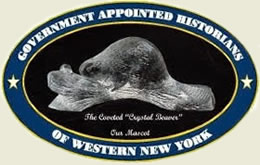
|
The Laws That Guide Us
|
The Laws That Guide Us: Historian's Laws of NYSLocal Government Historian Law § 57.07. Local historian; appointment; maintenance of historical edifices. 1. A local historian shall be appointed, as provided in this section, for each city, town or village, except that in a city of over one million inhabitants a local historian shall be appointed for each borough therein instead of for the city at large; and a county historian may be appointed for each county. Such historian shall be appointed as follows: For a city, by the mayor; for a borough, by the borough president; for a town, by the supervisor; for a village, by the mayor; for a county, by the board of supervisors. Such historian shall serve without compensation, unless the governing board of the city, town, village or county for or in which he or she was appointed or in the city of New York, the mayor, shall otherwise provide. In a city having a board of estimate, other than the city of New York, a resolution or ordinance establishing compensation or salary for such historian shall not take effect without the concurrence of such board. Each local government historian shall promote the establishment and improvement of programs for the management and preservation of local government records with enduring value for historical or other research; encourage the coordinated collection and preservation of nongovernmental historical records by libraries, historical societies, and other repositories; and carry out and actively encourage research in such records in order to add to the knowledge, understanding and appreciation of the community's history. The local authorities of the city, town, village or county for which such historian is appointed, may provide the historian with sufficient space in a safe, vault or other fire proof structure for the preservation of historical materials collected. Such local authorities and also the board of supervisors of each of the counties of the state are hereby authorized and empowered to appropriate, raise by tax and expend moneys for historical purposes within their several jurisdictions, including historical edifices, the erection of historical markers and monuments, the collection of war mementos, and, either alone or in cooperation with patriotic or historical organizations, the preparation and publication of local histories and records and the printing and issuing of other historical materials in aid of the work of the local historian. 2. Such local authorities and also the board of supervisors of each of the counties of the state are hereby authorized and empowered, in their discretion, to contract with the trustees of an historical association for the support of any or all historic edifices situated within the boundaries of such municipality; or may share the cost of maintaining the same as agreed with other municipal bodies; or may contract with the trustees of such historical associations to maintain said historic edifices for public use under such terms and conditions as may be stated in such contract. The amount agreed to be paid for such use under such contract shall be a charge upon the municipality and shall be paid in the same manner as other municipal charges, except in a city having a board of estimate, other than the city of New York, such contracts and any payments made thereunder shall be approved by such board of estimate. In the city of New York, such contracts and any payments thereunder shall be approved by the mayor. 3. Such local authorities are hereby authorized to establish and collect reasonable charges to defray the cost of searching for and reproducing copies of written or printed historical materials collected.
There have been several amendments to this law inlcuding Ch. 737, Laws of 1987, effective August 5, 1988, that partially clarified historians' records-related responsibilities. Under the Local Government Records Law, local government historians have three areas of responsibility: programs, records, and research. Section 1 reads as follows: For more information, refer to the publication Historical Records and the Local Government Historian, Number 81, pub. 2004. |

